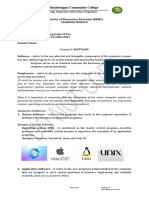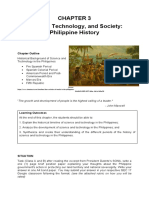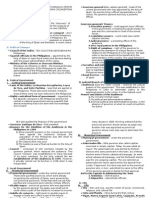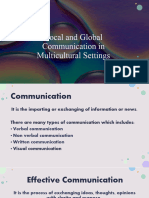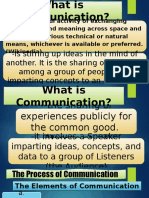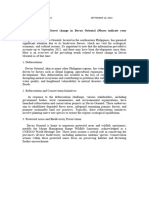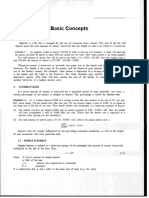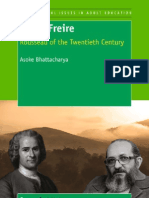STS-1st Activity
STS-1st Activity
Uploaded by
Mateo, Elijah Jonathan C.Copyright:
Available Formats
STS-1st Activity
STS-1st Activity
Uploaded by
Mateo, Elijah Jonathan C.Original Description:
Copyright
Available Formats
Share this document
Did you find this document useful?
Is this content inappropriate?
Copyright:
Available Formats
STS-1st Activity
STS-1st Activity
Uploaded by
Mateo, Elijah Jonathan C.Copyright:
Available Formats
Name: Elijah Jonathan c.
Mateo Date: September 5, 2022
Course and year level: BSCE 1A
SUBJECT: SCIENCE, TECHNOLOGY and SOCIETY
Module 1: General Concepts and Historical Developments in STS
Activity 1.1
Using the table below, list down ten products of technology you see in your homes and
identify its uses.
Technologies Uses
1. Mobile phone
Use in communication, taking pictures, games and etc.
Use to manipulate data easily and quickly, create text
2. computer
documents and etc.
The same uses as computer, but laptop can be easily
3. laptop
moved and used in a variety of locations.
Use to get access to data, variety of information and
4. Internet
communication.
Use for entertainment, watch films movies and any other
5. TV
informations like news, documentaries etc.
Use for communication, listening to news and for listening
6. Radio
music.
7. Washing machine Use to wash clothes.
8. Electric fan Use to circulate air at home.
9. Refrigerator Use to preserve food.
10. Light bulbs Use to bring light at home.
Activity 1.2
1. Read and study the PowerPoint Presentation on the History of Science and
Technology in the World: Ancient, Middle and Modern Ages (See attachment 1).
2. Using the space provided, describe briefly how science and technology evolved
during each period in history.
Science and technology have existed since the beginning of time. It
evolved from a simple way of life, such as in prehistoric times, when people only
used stone tools to gather their food while hunting and people only lived in
caves with no proper settlements. However, until a few times, ancient
innovations tended to develop creative ideas of living, such as the first
development of writing used for communication, the invention of wheels for
transportation, and in terms of architecture and engineering, where ancient
people, specifically the Egyptians, built the Great Pyramid. Studying for life
conservation has been part of civilization as well, and as until now, those great
ancient people imparted great knowledge that helps the modern world. Because
of ancient civilization, the middle ages enhanced science and technology more
than before. The emergence of printing books and other documents in order to
save important data, the progression of a better body of knowledge in the study
of health and medicine, and the development of the first calendars and clocks.
In terms of engineering, during the Middle Ages, they developed control of
waterways and also developed new weapons with the use of guns as they
developed gun powder. Finally, in the modern era, all the previous ages'
development have been greatly improved and developed. More progress has
been made in terms of the industrial revolution, in which humans have become
more reliant on machines. At that time, the usage of electricity, batteries, the
transmitter, and the telephone started to become commonplace. The invention
of cars and airplanes reduced travel time and improved life efficiency in terms
of vehicle transportation. For the time being, science and technology are
continually evolving and changing, which could have an impact on everyone's
lives and enhance societal well-being.
Activity 1.3
1. Read and review “A History of Science and Technology in the Philippines” by
Olivia C. Caoili (see attachment 2).
2. Using the space below, create a timeline highlighting the major discoveries and
development in science and technology during each period.
THE MAJOR DISCOVERIES AND DEVELOPMENT IN SCIENCE
AND TECHNOLOGY IN THE PHILIPPINES
The earliest Filipinos had only begun a typical level of technological
advancement. The metals that the early Filipinos learned to craft into
tools and utensils were copper, gold, bronze, and eventually iron. Aside
from farming, the Filipinos were also involved in cotton weaving, iron
smelting, pottery production, and glass ornamentation. The Filipinos
PRECOLONIAL had also mastered boat construction for the coastal trade. They used
PERIOD
their own weights and measurements, as well as their own writing
(900-1521) system. Some towns are well-known for their wooden boats. They
calculated years by the phases of the moon and from one crop to the
next rather than using a calendar. Filipinos were fluent readers and
writers in their native language. A written literature tradition does not
appear to have developed at that time. This would have resulted in a
more organized collection and dissemination of knowledge, which is
critical for scientific and technological advancement
During the Spanish colonial period, Spaniards established schools,
hospitals, and began scientific research, which had a significant impact
on the rise of the country's professions. However, the role of religious
orders in the conquest and colonization of the archipelago, as well as
the colonial powers' economic and trade policies, greatly influenced the
direction and pace of scientific and technological development. They
SPANISH established scientific institutions and formalized education. Parish
COLONIAL schools were established, where religion, reading, arithmetic, and
PERIOD music were taught. Natives were thought to have more advanced
agricultural methods. Later, they established colleges and universities
(1521-1898) throughout the country, including the University of Santo Thomas,
Asia's oldest university. The Spaniards invented town planning and
building with stones, bricks, and tiles. Agricultural and industrial
development in the Philippines during the first two centuries of Spanish
rule The Philippines has evolved into a primary agricultural exporter
economy, with some government support for agricultural research and
education.
The American colonization of the Philippines saw remarkable
advancements in science and technology. This was made possible by
the government's concurrent encouragement and support of an
extensive public education system, as well as the awarding of
scholarships for post-secondary study in science and engineering, the
establishment of science research agencies, and the establishment of
AMERICAN science-based public services. In the Philippine educational system, the
COLONIAL Philippine Commission added science classes as well as industrial and
vocational education, but they soon discovered that these topics were
(1898-1946) not well-liked by the locals. The colonial authorities in America set up
other offices that, by virtue of how they operated, aided in the expansion
of scientific inquiry. During the American government, colonial
economic policy and education policy were not coordinated. While
higher education in the sciences and engineering was made available
to Filipinos, the country's economy remained primarily agricultural.
An era of transition to political independence was launched along
with the Philippine Commonwealth. The Commonwealth
COMMONWEALTH
government also adopted measures to encourage and assist
PERIOD private Filipino businessmen in the establishment of industries
and manufacturing facilities. The Constitution also included a
(1935-1945)
provision (Article XIII, Section 4) declaring that "The State shall
promote scientific research and invention; arts and letters shall be
under its patronage."
During this time, the rise of professional organizations of
scientists and engineers coincided with the expansion of higher
education in the Philippines. The emergence of acts and laws
Science and related to science and technology indicates increased
Technology government concern and support for the development of
since Philippine science and technology. Six new institutes were
Independence
established: the National Institutes of Physics, Geological
(1946-1969) Sciences, Natural Sciences Research, Chemistry, Biology, and
Mathematical Sciences, encouraging many students to pursue
Analysis 1.
science and technology degrees.
1. On your own words, what makes technology good or bad for us?
Technology, in my opinion and based on what I have observed in daily life, is good
for us because it can make us more productive in anything and also make life easier than
it would be without technology. Technology has been very important and has greatly
contributed in terms of agriculture, industrial, transportation, communication, and actually
helps me right now in working with my school activities, making me more productive and
consuming less time. Without technology, I'm writing this on bond paper right now, and if
that happens, I won't be able to submit it on time because it's so time-consuming. Even if
some argue that technology is bad for us, consider what would happen if there was no
technology. While technology has been detrimental in some ways, it is beneficial if we
use technology correctly. Everything around us has negative consequences, so let us set
proper limits on everything.
Application
• To check your understanding, write your own reaction/impression of our life today with
the advancement in science and technology. Use the space given below.
Today, September 5, 2022, I did nothing but face my mobile phone and laptop,
listening to music while reading the syllabus that my instructor gave me and answering
activities. This made me realize that I have never experienced a life without technology.
Well, I'm not interested in learning science, but I know science has made great
contributions to the advancement of technology as it develops new knowledge to help
technologies also gain new ideas, so that’s why technology is also advancing.
According to what I see today, life without science and technology can be compared to
very old times. When there was no advanced knowledge of science and technology,
people simply used stones to hunt, caves for shelter, and clothes made of animal hair,
then burned fire using rocks and anything. I can't even imagine what my life would be
like in that situation, and I think I can't even survive a single day of that. The field of
science and technology seems to be advancing and advancing, and I just have less
knowledge of it. I was just impressed with how they came up with these inventions, and
I was actually thankful, but it made me realize that I did nothing to contribute.
You might also like
- Living in The IT Era - Lesson 3 Activity 3No ratings yetLiving in The IT Era - Lesson 3 Activity 310 pages
- Canoy, Hanizan D. - Activity C - Lesson 2No ratings yetCanoy, Hanizan D. - Activity C - Lesson 24 pages
- "Sivilized, As They Called It:" A Postcolonial Interpretation of Huckleberry Finn (Mark Twain)100% (2)"Sivilized, As They Called It:" A Postcolonial Interpretation of Huckleberry Finn (Mark Twain)25 pages
- GEED 10083 Science, Technology, and Society: Polytechnic University of The Philippines Lopez, Quezon BranchNo ratings yetGEED 10083 Science, Technology, and Society: Polytechnic University of The Philippines Lopez, Quezon Branch9 pages
- Reaction On Russell's The Value of PhilosophyNo ratings yetReaction On Russell's The Value of Philosophy1 page
- Module 1 - History: Definition, Nature, Methodology and ImportanceNo ratings yetModule 1 - History: Definition, Nature, Methodology and Importance69 pages
- A Tracer Study of SVSF Senior High School Graduate Engagement in Entrepreneurship100% (1)A Tracer Study of SVSF Senior High School Graduate Engagement in Entrepreneurship4 pages
- Science, Technology, and Society: Philippine History: Chapter OutlineNo ratings yetScience, Technology, and Society: Philippine History: Chapter Outline9 pages
- Neoliberalism and Its Discontents ReportNo ratings yetNeoliberalism and Its Discontents Report11 pages
- The National Service Training Program (Ra 9163) : NSTP - Cwts 1 I. TitleNo ratings yetThe National Service Training Program (Ra 9163) : NSTP - Cwts 1 I. Title4 pages
- City College of Tagaytay: Republic of The PhilippinesNo ratings yetCity College of Tagaytay: Republic of The Philippines9 pages
- Philippine History, Geography and Institutions (SOSC4) 5 Lesson (Iv. Spanish Colonization)100% (1)Philippine History, Geography and Institutions (SOSC4) 5 Lesson (Iv. Spanish Colonization)7 pages
- Agriculture Has Always Been A Vital Part of The Philippine NationNo ratings yetAgriculture Has Always Been A Vital Part of The Philippine Nation2 pages
- Reviewer in Purposive Communication BeedNo ratings yetReviewer in Purposive Communication Beed2 pages
- Film or Cinema Pertains To The Movies That Carry Audiovisual Messages and Are UsuallyNo ratings yetFilm or Cinema Pertains To The Movies That Carry Audiovisual Messages and Are Usually3 pages
- Purposive Communication: at The End of The Unit, The Students Are Expected To Have: Learning Outcomes100% (1)Purposive Communication: at The End of The Unit, The Students Are Expected To Have: Learning Outcomes6 pages
- Contemporary World - Economic and Technological GlobalizationNo ratings yetContemporary World - Economic and Technological Globalization2 pages
- Lesson 7 Powerpoint History of Market Integration 1. Agricultural and Industral RevolutionNo ratings yetLesson 7 Powerpoint History of Market Integration 1. Agricultural and Industral Revolution96 pages
- Modern Office Administration - Navigating The Digital WorkplaceNo ratings yetModern Office Administration - Navigating The Digital Workplace6 pages
- Transes-Foundations of Social Studies-M1No ratings yetTranses-Foundations of Social Studies-M114 pages
- Roles Played by Technological Advancements - 20231112 - 093129 - 0000No ratings yetRoles Played by Technological Advancements - 20231112 - 093129 - 00008 pages
- Content and Contextual Analysis of Selected Primary Sources in Philippine HistoryNo ratings yetContent and Contextual Analysis of Selected Primary Sources in Philippine History16 pages
- Case Study For Basic Theories As Frameworks in Ethics Art and OffenseNo ratings yetCase Study For Basic Theories As Frameworks in Ethics Art and Offense5 pages
- GED 106 PURCOM Midterms Reviewer Invitation To EditNo ratings yetGED 106 PURCOM Midterms Reviewer Invitation To Edit7 pages
- The Influence of Modern Tourism On The Cultural Identity of Indigenous Community in Floridablanca, PampangaNo ratings yetThe Influence of Modern Tourism On The Cultural Identity of Indigenous Community in Floridablanca, Pampanga30 pages
- This Study Resource Was: Activity 06: Intellectual Revolutions That Defined Society: Information AgeNo ratings yetThis Study Resource Was: Activity 06: Intellectual Revolutions That Defined Society: Information Age2 pages
- Science, Technology, and Society: Philippine HistoryNo ratings yetScience, Technology, and Society: Philippine History4 pages
- Corrosion Is A Process of Deterioration or Degradation of Metals Through An Unwanted Chemical or Electrochemical Attack by Its EnvironmentNo ratings yetCorrosion Is A Process of Deterioration or Degradation of Metals Through An Unwanted Chemical or Electrochemical Attack by Its Environment9 pages
- Download ebooks file The ends of empire : the last colonies revisited Robert Aldrich all chapters100% (1)Download ebooks file The ends of empire : the last colonies revisited Robert Aldrich all chapters57 pages
- Paulo Freire Rousseau of The Twentieth Century100% (1)Paulo Freire Rousseau of The Twentieth Century323 pages
- ISLAA - Political Subjective Maps - Exhibition BookletNo ratings yetISLAA - Political Subjective Maps - Exhibition Booklet40 pages
- Global Politics A New Introduction by Jenny Edkins, Maja ZehfussNo ratings yetGlobal Politics A New Introduction by Jenny Edkins, Maja Zehfuss8 pages
- Unsettling Settler Societies - Yuval Davis100% (2)Unsettling Settler Societies - Yuval Davis348 pages
- 1982 - R. J. Vincent - Race in International RelationsNo ratings yet1982 - R. J. Vincent - Race in International Relations14 pages
- Theories of European Imperialism in TheNo ratings yetTheories of European Imperialism in The14 pages
- 21stcentury - An Overview of PreColonial, Colonial and Post ColonialNo ratings yet21stcentury - An Overview of PreColonial, Colonial and Post Colonial32 pages
- Forest Laws and Their Impact On Adivasi Economy in Colonial India1No ratings yetForest Laws and Their Impact On Adivasi Economy in Colonial India112 pages
- The Making of A Global World Padhai Ak Mazza Best Notes 2023100% (1)The Making of A Global World Padhai Ak Mazza Best Notes 20238 pages
- Objectives of Teaching English at The Intermediate and Degree LevelNo ratings yetObjectives of Teaching English at The Intermediate and Degree Level11 pages
- Huyssen 2007 Geographies of Modernism in A Globalizing WorldNo ratings yetHuyssen 2007 Geographies of Modernism in A Globalizing World20 pages
- "Sivilized, As They Called It:" A Postcolonial Interpretation of Huckleberry Finn (Mark Twain)"Sivilized, As They Called It:" A Postcolonial Interpretation of Huckleberry Finn (Mark Twain)
- GEED 10083 Science, Technology, and Society: Polytechnic University of The Philippines Lopez, Quezon BranchGEED 10083 Science, Technology, and Society: Polytechnic University of The Philippines Lopez, Quezon Branch
- Module 1 - History: Definition, Nature, Methodology and ImportanceModule 1 - History: Definition, Nature, Methodology and Importance
- A Tracer Study of SVSF Senior High School Graduate Engagement in EntrepreneurshipA Tracer Study of SVSF Senior High School Graduate Engagement in Entrepreneurship
- Science, Technology, and Society: Philippine History: Chapter OutlineScience, Technology, and Society: Philippine History: Chapter Outline
- The National Service Training Program (Ra 9163) : NSTP - Cwts 1 I. TitleThe National Service Training Program (Ra 9163) : NSTP - Cwts 1 I. Title
- City College of Tagaytay: Republic of The PhilippinesCity College of Tagaytay: Republic of The Philippines
- Philippine History, Geography and Institutions (SOSC4) 5 Lesson (Iv. Spanish Colonization)Philippine History, Geography and Institutions (SOSC4) 5 Lesson (Iv. Spanish Colonization)
- Agriculture Has Always Been A Vital Part of The Philippine NationAgriculture Has Always Been A Vital Part of The Philippine Nation
- Film or Cinema Pertains To The Movies That Carry Audiovisual Messages and Are UsuallyFilm or Cinema Pertains To The Movies That Carry Audiovisual Messages and Are Usually
- Purposive Communication: at The End of The Unit, The Students Are Expected To Have: Learning OutcomesPurposive Communication: at The End of The Unit, The Students Are Expected To Have: Learning Outcomes
- Contemporary World - Economic and Technological GlobalizationContemporary World - Economic and Technological Globalization
- Lesson 7 Powerpoint History of Market Integration 1. Agricultural and Industral RevolutionLesson 7 Powerpoint History of Market Integration 1. Agricultural and Industral Revolution
- Modern Office Administration - Navigating The Digital WorkplaceModern Office Administration - Navigating The Digital Workplace
- Roles Played by Technological Advancements - 20231112 - 093129 - 0000Roles Played by Technological Advancements - 20231112 - 093129 - 0000
- Content and Contextual Analysis of Selected Primary Sources in Philippine HistoryContent and Contextual Analysis of Selected Primary Sources in Philippine History
- Case Study For Basic Theories As Frameworks in Ethics Art and OffenseCase Study For Basic Theories As Frameworks in Ethics Art and Offense
- GED 106 PURCOM Midterms Reviewer Invitation To EditGED 106 PURCOM Midterms Reviewer Invitation To Edit
- The Influence of Modern Tourism On The Cultural Identity of Indigenous Community in Floridablanca, PampangaThe Influence of Modern Tourism On The Cultural Identity of Indigenous Community in Floridablanca, Pampanga
- This Study Resource Was: Activity 06: Intellectual Revolutions That Defined Society: Information AgeThis Study Resource Was: Activity 06: Intellectual Revolutions That Defined Society: Information Age
- Science, Technology, and Society: Philippine HistoryScience, Technology, and Society: Philippine History
- Corrosion Is A Process of Deterioration or Degradation of Metals Through An Unwanted Chemical or Electrochemical Attack by Its EnvironmentCorrosion Is A Process of Deterioration or Degradation of Metals Through An Unwanted Chemical or Electrochemical Attack by Its Environment
- Download ebooks file The ends of empire : the last colonies revisited Robert Aldrich all chaptersDownload ebooks file The ends of empire : the last colonies revisited Robert Aldrich all chapters
- ISLAA - Political Subjective Maps - Exhibition BookletISLAA - Political Subjective Maps - Exhibition Booklet
- Global Politics A New Introduction by Jenny Edkins, Maja ZehfussGlobal Politics A New Introduction by Jenny Edkins, Maja Zehfuss
- 1982 - R. J. Vincent - Race in International Relations1982 - R. J. Vincent - Race in International Relations
- 21stcentury - An Overview of PreColonial, Colonial and Post Colonial21stcentury - An Overview of PreColonial, Colonial and Post Colonial
- Forest Laws and Their Impact On Adivasi Economy in Colonial India1Forest Laws and Their Impact On Adivasi Economy in Colonial India1
- The Making of A Global World Padhai Ak Mazza Best Notes 2023The Making of A Global World Padhai Ak Mazza Best Notes 2023
- Objectives of Teaching English at The Intermediate and Degree LevelObjectives of Teaching English at The Intermediate and Degree Level
- Huyssen 2007 Geographies of Modernism in A Globalizing WorldHuyssen 2007 Geographies of Modernism in A Globalizing World




